Cryptostorm Review
Cryptostorm is a VPN aimed at hardcore techies, or people who are willing to become one to protect their privacy. It is, without a doubt, one of the most user unfriendly VPNs we've reviewed, but its security is excellent and the price is right. Read our full cryptostorm review for the details.
Cryptostorm sits in between good and bad VPNs, earning a rating of “just okay.” It comes from Vancouver, Canada, but has roots in Iceland and is committed to being the safest in its class. Dedicated to privacy and security, cryptostorm may seem a bit daunting at first glance, but the virtual private network has its good sides.
It is just right for people who place little value on nice interfaces, user experience and customer support. In the end, you use a VPN to ensure your own data protection and security, which is what you get with this VPN, no more and no less. More novice users may want to check out our selection of the best VPN providers, however, or check out ExpressVPN which tops that list.
In this cryptostorm review, we’ll talk about our experience after extensively testing (and criticizing) this unconventional VPN. We’ll discuss features, pricing, ease of use, supported devices, server locations, speed, security and customer service before giving our verdict.
Alternatives for cryptostorm
- 1
- : PayPal, Credit card, Bitcoin, UnionPay, iDeal, Sofort, Giropay, Pixpay, Sepa Direct Debit
- : 8
- :
- :
- :
- :
Average speedDownload Speed91 MbpsUpload Speed9 MbpsLatency4 ms - 2
- : PayPal, Credit card, bitcoin, Amazon Pay
- : 7
- :
- :
- :
- :
Average speed - 3
- : PayPal, Credit card, Google Pay, JCB, UnionPay, Bitcoin, Ethereum, X-Coin
- : 10
- :
- :
- :
- :
Average speedDownload Speed88 MbpsUpload Speed9 MbpsLatency4 ms - 4
- : PayPal, Credit card
- : 8
- :
- :
- :
- :
- 5
- : PayPal, Credit card, Amazon, Paygarden, Apple Pay, Google Pay
- : Unlimited
- :
- :
- :
- :
Average speedDownload Speed67 MbpsUpload Speed9 MbpsLatency114 ms
Strengths & Weaknesses
Strengths:
- High security standards
- Free plan
- Killswitch
- Supports bitcoin
- No logs
- Linux support
- TOR support
Weaknesses:
- Very slow
- Not good for the technically impaired
- Not good for streaming
- Few servers outside of Europe & North America
- Terrible interface
- Almost no customer support
- Terrible website
Features
Cryptostorm offers many security options to configure, apart from VPN protocols, where it only allows you to use OpenVPN. That said, you can choose between the transport protocols, configure ECC instances and IPv6. We’ll talk more about that in the security section below.
Protect Your Privacy. Get Our Free VPN Guide Now!
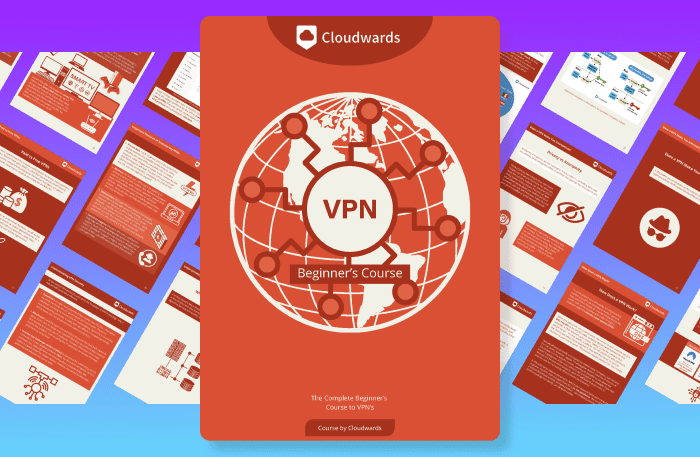
- Comprehend the essential role a VPN plays in safeguarding your digital life
- Gain a deep understanding of how VPNs function under the hood
- Develop the ability to distinguish fact from fiction in VPN promotions
In addition to choosing the port you use, you can choose between the locations you want to connect to, which is pretty much standard nowadays. It also comes with a killswitch, DNS leak protection, WebRTC leak prevention and many other features relevant to security.
We were able to access Netflix, even with the free version, but the speed was so bad it was unwatchable. If TV shows are a priority, check out our best VPN for Netflix selection, instead.
According to the vendor, the VPN is also suitable for torrenting, and thanks to its high security standards, we would rank it among the best VPN for torrenting, too. Like Netflix, though, the terrible speeds mean it won’t be making that list anytime soon.
Apart from that, there aren’t many features of note. Cryptostorm is focused on securing your connection and, in our experience, not much else. If you want bells and whistles, it isn’t the provider for you.
Cryptostorm Features Overview
| Features | |
|---|---|
| Payment methods | PayPal, CCBill, altcoin, Bitcoin |
| Accepts cryptocurrency | |
| Simultaneous connections | 6 |
| Supports split tunneling | |
| Unlimited bandwidth | |
| Free trial available | Free version |
| Refund period | |
| Worldwide server amount | 28 Servers in 16 Countries |
| Desktop OSes | Windows, MacOS, Linux |
| Mobile OSes | Android, iOS |
| Browser extensions | |
| Can be installed on routers | |
| Can access Netflix US | |
| Can access BBC iPlayer | |
| Can access Hulu | |
| Can access Amazon Prime Video | |
| Encryption types | 256-AES, ephemeral ciphers |
| VPN protocols available | OpenVPN, Wireguard |
| Enabled at device startup | |
| Allows torrenting | |
| No-logging policy | |
| Passed DNS leak test | |
| Killswitch available | |
| Malware/ad blocker included | |
| Live Chat | |
| Email support | 24/7 |
| Phone support | |
| User forum | |
| Knowledgebase |
Pricing
Cryptostorm uses a token-based pricing system, which is unusual for a VPN. The service isn’t as cheap as GooseVPN, as you can read in our GooseVPN review, but it’s still reasonable. If you want more value for your money, you might want to check out our Private Internet Access review.
With cryptostorm, you buy tokens to use its VPN network. In contrast to many other VPN providers, you can choose between one-time orders and recurring subscriptions.
Since it has jumped on the blockchain hype, it also accepts bitcoin for all plans. In fact, you can only pay with PayPal or cryptocurrencies. That combined with the token-based pricing system makes cryptostorm one of the few truly anonymous VPNs on the market.
Tokens don’t expire, either. They only begin depleting when you start using them. If you have purchased a token and used less than 50 percent of it, you can get your money back. For example, if you buy a monthly token and only use it for a week, you can contact support and ask them for a full refund.
The plans differ in duration alone. As with most VPN providers, the longest subscription is also the cheapest. There are no restrictions on bandwidth, but the tokens are limited to one device, except on the annual and lifetime subscriptions, which allow four and six, respectively.
- Unlimited GB
- 1
- Yes
- Unlimited GB
- 1
- Yes
- Unlimited GB
- 1
- Yes
More plans
- Unlimited GB
- 4
- Yes
- Unlimited GB
- 6
- Yes
In addition, cryptostorm offers a free plan, called cryptofree, which differs from the others in functionality, but not bandwidth. While using cryptofree, we noticed much slower speed than the paid options, as you’ll see in our speed tests.
Another drawback of the free version is that it doesn’t let you select the server you want to connect to.
Price-wise, everything is solid here. The fact that you can’t pay with credit cards or cold, hard cash like Mullvad (read our Mullvad review) is a bit annoying; however, with the ability to purchase lifetime access or pay at your own pace, cryptostorm looks excellent here.
Ease of Use
The ease of use is, in one word, horrible. The website has color combinations that burn the eyes and descriptions that are difficult to understand, even for a software engineer.
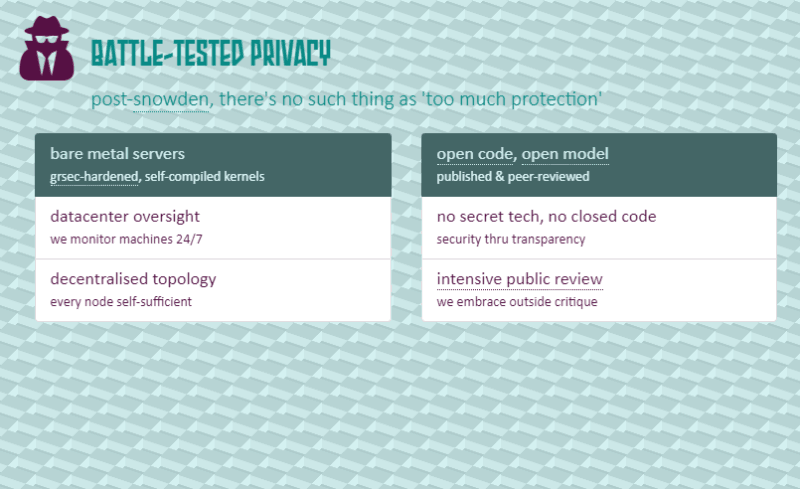
We installed the free version for this review. The good thing about cryptostorm is that you don’t have to create a user account. In fact, you can’t create one.
Make sure to install cryptostorm from the official website. If you type “download cryptostorm” into Google, you will get quite a few pages that look dubious, so make sure to avoid those. Here is the right download link.
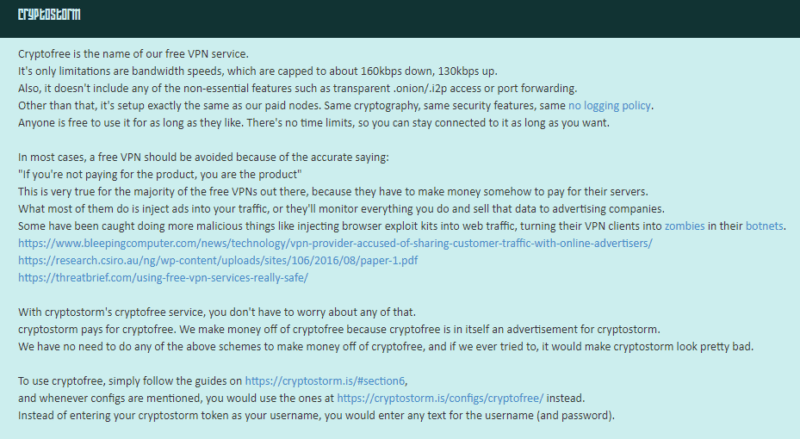
Select the correct version for your operating system. The download will start automatically and installation instructions for your OS will open.

After you have downloaded the installation file, run it and follow the installation wizard. Then, launch the service and you will see the following.
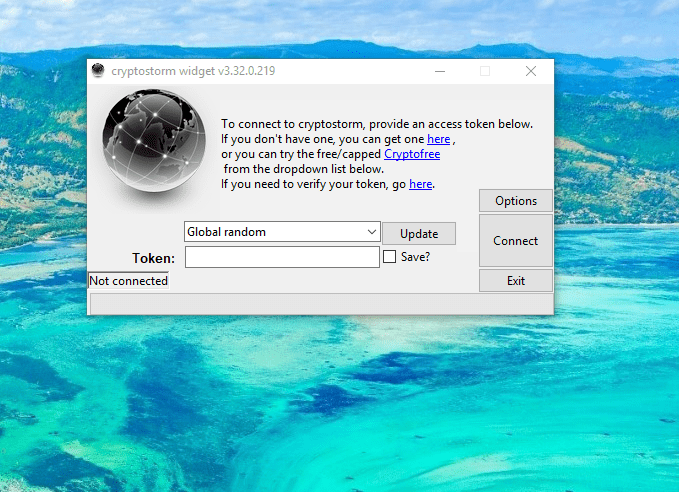
Depending on whether you have purchased a token, you can choose between a few options here. If you’re using the free version, you can select “cryptofree” from the central drop-down menu. You will then see how the “token” input field fills automatically. After that, click “connect” and wait until cryptostorm does so.
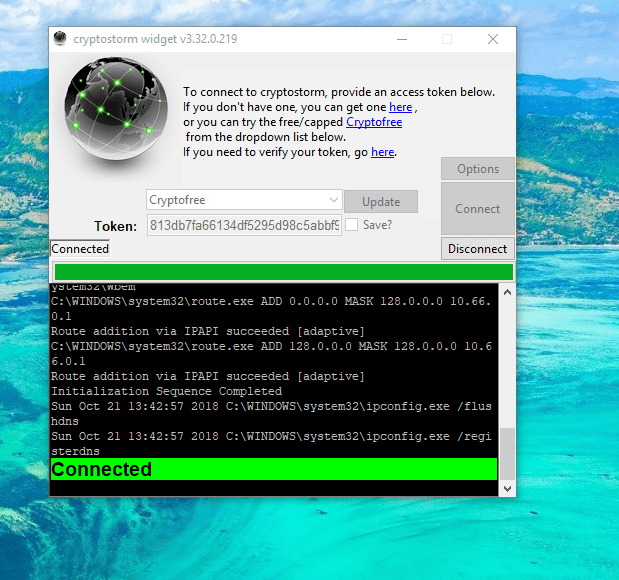
The biggest flaw is that the free version does not allow you to choose which server you want to connect to. Plus, it doesn’t tell you which server you are actually connected to, so you have to check that manually.
Besides that, the main menu is bare. “Update” refreshes the server list, “options” opens the advanced settings and “exit” closes the application.
If you click on “options,” you will see three submenus: “startup,” “connecting” and “security.”
Under “startup,” you will find settings related to starting and stopping cryptostorm. There are language settings, too, though they are bizarre. You can only choose between English and Japanese.
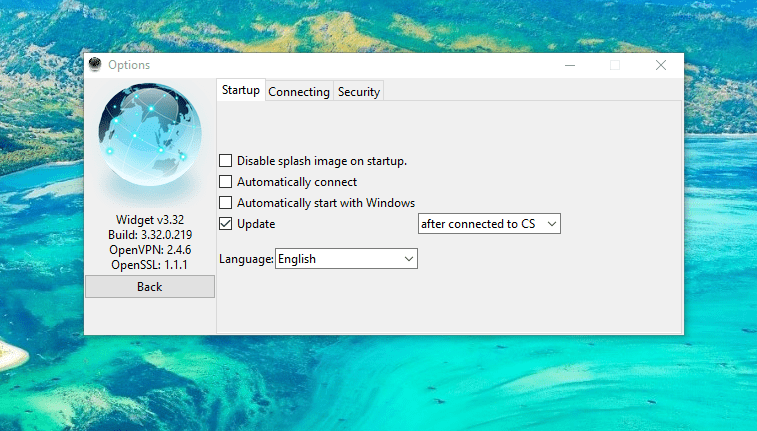
The next submenu, “connecting,” has configuration options for the connection to the VPN servers. You can select the port cryptostorm connects to, the transport protocol it uses (UDP or TCP) and the timeout settings.
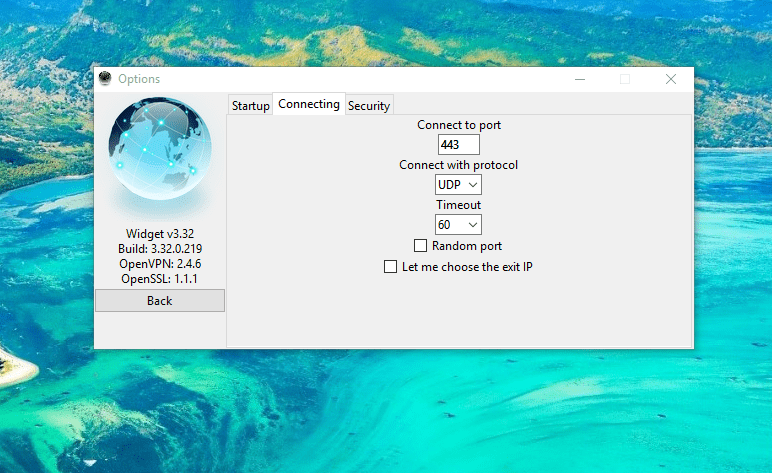
As the name suggests, you’ll find security settings in the “security” menu. ECC, IPv6, WebRTC, DNS leak prevention, DNSCrypt and a killswitch are the available options. If that was all Greek to you, check out our VPN security guide.
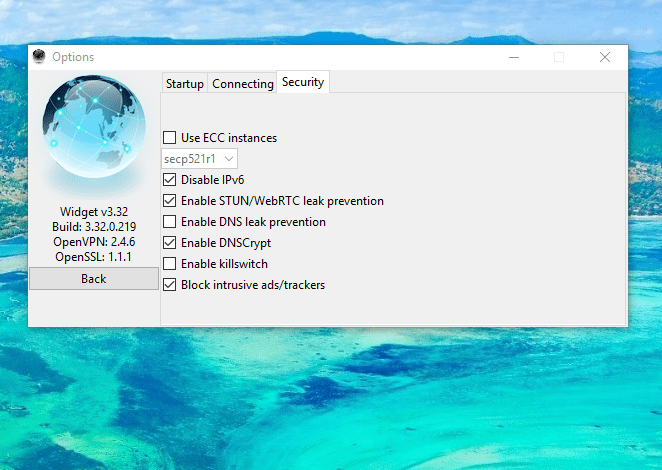
The main menu has a few things that caught our eye. As soon as you’re connected to a server, you can’t access the options menu anymore. You have to cut the connection to do so. In addition, the “save” checkbox does not work. We had to enter the token again and again.
What’s more, the application freezes when connecting and disconnecting. From our experience, cryptostorm feels like a concept less beta version that has yet to be finished.
Supported Devices
Cryptostorm covers Windows, macOS and Linux. It’s also configurable with your router and does not disappoint on the mobile side, either. Supporting most Android and iOS devices makes it look pretty good. It can also combine with the Tor network.
The number of simultaneous connections you can establish depends on the plan you purchase.
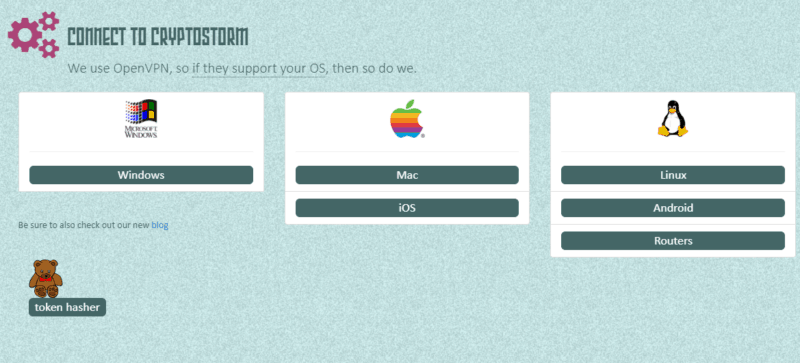
Here is how many connections you get with each plan:
- One week: one connection
- One month: one connection
- Three months: two connections
- Six months: three connections
- One year: four connections
- Two years: five connections
- Lifetime: six connections
As this can get a bit confusing, we won’t be adding cryptostorm to our list of the best VPN for multiple devices, or, thanks to its interface, to the best VPN for Linux, either.
Server Locations
Cryptostorm has 28 servers, covering roughly the same area as TunnelBear (read our TunnelBear Review). Most are in Europe (14) and North America (14), which is not surprising since it is a Canadian VPN provider with roots in Iceland.
Russia, Ukraine and many EU member states were not considered by the VPN service. By itself, 13 countries — two servers are in Germany — may sound like a lot, but there are 47 countries in Europe, so it’s more like a fraction.
The only countries where you can choose between cities are Germany (two), Canada (two) and the U.S. (14). There’s not a single server in South America, Africa or Oceania. Asia is also covered less than inadequately, with a lone server in Hong Kong. CyberGhost and its 1,300+ servers make cryptostorm look bad (read our CyberGhost review).
Speed
We ran speed tests from Germany using speedtest.net and speedof.me. Here are the results.
| Location | Ping ms | Download Mbps | Upload Mbps |
|---|---|---|---|
| Unprotected | 33 | 24.51 | 5.88 |
| France on Cryptofree | 1341 | 0.48 | 0.79 |
| France | 54 | 3.59 | 4.55 |
| Hong Kong | 233 | 0.22 | 0.53 |
| Dallas, United States | 210 | 3.15 | 6.96 |
| Vancouver, Canada | 148 | 4.32 | 4.67 |
| Finland | 82 | 2.38 | 4.67 |
| Average | 345 | 2.36 | 3.7 |
We tested each location in five runs and averaged the measured values. It is interesting to note that the download and upload rates vary greatly from run to run. That’s why we decided to bring in speedof.me, which returned the same results.
For the server in France, for example, we were able to determine values within a range of 3.44 Mbps to 9.61 Mbps. Hong Kong, Dallas and Vancouver were also affected by such fluctuations.
Latency is still within reasonable limits, as long as you don’t change continents. In Germany, the response times of the European servers were decent, so you can use cryptostorm for gaming. It won’t be making our best VPN for gaming list, though.
The download and upload speeds are, frankly, bad. Even connecting to a neighboring country such as France dropped our rate by 80 percent. We were astonished to find that the connection to Canada has higher download and upload speeds than the servers in France and Finland, so it’s not a consideration for the best VPN for streaming, either.
Cryptostorm’s speeds are just plain bad. The latency times are the only redeemable factor. Otherwise, it won’t be earning a place among the fastest VPN providers without major improvements.
Security & Privacy
Cryptostorm has great security and privacy. It uses OpenVPN and works over a TLS/SSL channel. As for the cipher, the VPN convinces us with ChaCha, an algorithm optimized for mobile devices. ChaCha is comparable to AES, the de facto standard in encryption, but it’s much faster.
On top of that, cryptostorm protects its data with ECC, a public key encryption system. With such a system, you always have two keys: one private and one public. That means you can only decrypt the encrypted information if you have the private key. The private key uses mathematical functions for decryption.
ECC is one of them. It is basically a mathematical procedure to decrypt public and private keys. An alternative here is RSA. By comparison, if you have a 256-bit ECC key, you would need a 3072-bit RSA key in order to obtain the same level of security. That does not mean ECC is more secure than RSA, just that it performs better.
Cryptostorm lets you choose if you want to use ECC and if so, which encryption signature you want to use. You can pick “secp521r1,” Ed25519” or “Ed448.” Those are the different private key types (coordinates and signatures) you can choose.
We subjected cryptostorm to an IP leak test and got good results. Not only was the website unable to detect that we were using a VPN, but our real IP address was hidden as well. The service passed the WebRTC leak and DNS leak tests without problems, too.
cryptostorm Privacy
We are also impressed by the token system, which guarantees that no user information is stored. If you pay with bitcoin or any other cryptocurrency, you shouldn’t have any concerns about privacy. The tokens are deleted regularly, according to the provider. On the other hand, if you lose your token, cryptostorm won’t be able to help you.
Since everyone who buys a token via PayPal receives an email with it, it’s questionable how anonymous you actually are. The email address could be used to connect your identity to the token and cryptostorm would know what you are doing. In that case, your token would be your very own digital ID.
The service claims that no customer information is stored, but we are skeptical. It offers a money-back guarantee if less than 50 percent of the token has been used. If you buy a one-year token, cryptostorm would have to keep your information for at least six months to comply with its guarantee. That seems contradictory.
Compared to other VPN providers, such as HideMyAss (read our HideMyAss review) or VPNArea (read our VPNArea review), though, that is complaining on a high level. All in all, cryptostorm can’t be fooled in terms of security and could rank among the safest VPNs out there.
Customer Service
Cryptostorm offers email support and that’s about it. There is no live chat or knowledgebase, but there is a forum where users can ask questions. Things don’t get much clearer in the forum, though. There are two categories: “active topics” and “unanswered topics.”
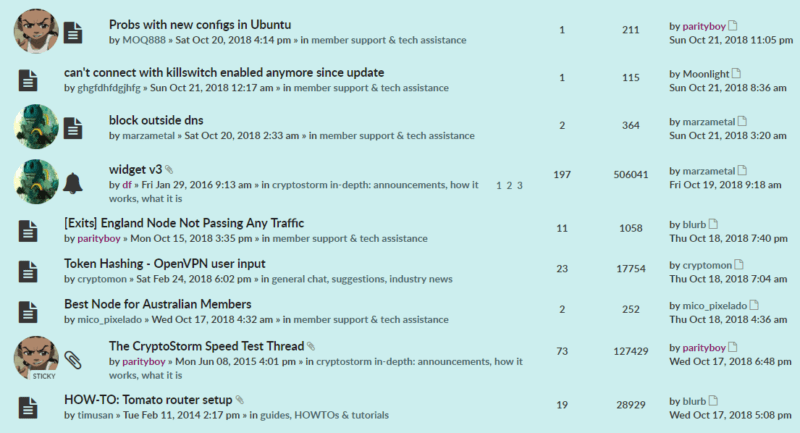
The FAQ section has nothing to do with the cryptostorm VPN, but refers to the forum itself. Among other things, you can find questions like “how do I publish a post?” and other forum-related topics there. One could assume that someone using such a deep-tech VPN voluntarily — there are enough alternatives — would know how to deal with a forum.
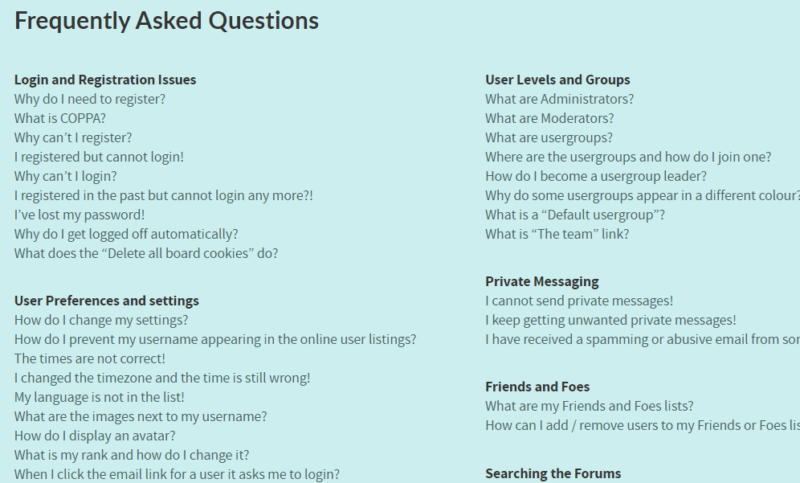
The customer support is hard to find. On the website, you can see the following icons under “contact,” which don’t help much.

We asked support if we need to verify a token before using it and what the token hasher is.
We didn’t understand what the answer was, but we have to point out that the reaction time of 30 minutes is good. That said, a salutation and being polite would be nice.
To sum it up, we found ourselves often on GitHub, trying to look for the answer to our question because whatever it is that cryptostorm offers you, it can hardly be called “customer support.”
The Verdict
When you visit cryptostorm’s website, you are first confronted with a tidal wave of buzzwords, such as “token-based,” “open source,” “non-compromised,” “bare metal servers” and “screamin’ fast,“ which helps develop a certain skepticism toward the vendor.
Poor design, an unmanageable website and a bunch of technical terms with which a normal person can’t deal lead to even more skepticism.
That has nothing to do with being a geek. Rather, it’s a weak excuse to blame design errors on the branding. For many users, cryptostorm may look like a half-heartedly programmed beta version of a VPN that a student made while working on a project.
Those who dig deeper will not be disappointed, though. Cryptostorm dominates in one area in particular: data protection and security. The service is just right for people who don’t care about the “frills” around their VPNs, but who primarily attach importance to online safety.
Have you used cryptostorm before? How did you like it? Let us know in the comments and thanks for reading.


